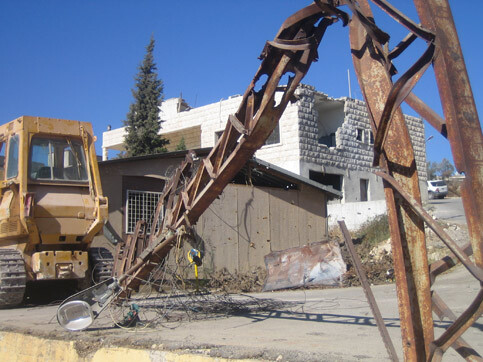IRIN 3 September 2006

Electricity infrastructure in south Lebanon has been badly damaged. (Serene Assir/IRIN)
TAYBEH - Thirty-four days of Israeli bombardment have left many residential areas in south Lebanon without power. Towns and villages, particularly those nearest the border with Israel, are strewn with damaged power lines along the roads.
“This is what remains of our electricity lines,” said 12-year-old Ali, resident of Qantara village, pointing to lines a few feet away from him. “Nothing.”
Qantara is about 70 km south of Beirut and just a few kilometres north of the Israeli border. South Lebanon bore the brunt of Israel’s military offensive against the armed wing of Hezbollah, a Lebanese political party.
During the course of the conflict, Israel carried out aerial attacks on approximately 7,000 targets in Lebanon. A number of these bombing raids destroyed power stations, sub-stations and transformers.
Israel says it was targeting “terrorist infrastructure”.
“At home, we’re living by candlelight,” said a man from Taybeh, near Qantara, who did not want to be named. There is one generator in the town square, which they say was donated by the Iranian government. “It’s all very well. But it’s only enough to serve the homes and shops in the centre. As for the rest of us, there’s no electricity at all, day or night.”
The Government of Lebanon electricity authority, Electricite du Liban (EDL), has 14 teams across Lebanon working to repair damage to the electrical system. EDL expects repairs of the main power lines and switches to be completed in the next week.
While the authority says the main sub-stations in the south were not hit, it estimates that some 150 transformers, vital for the distribution of power, will need to be replaced, at a cost of US $900,000. At least 50 more need repair work. Until this happens, EDL says up to 90 percent of people in southern towns will remain without electricity.
Without electricity, daily life has become increasingly difficult. Machinery cannot be operated, food cannot be conserved and, most crucially, water cannot be pumped.
If repaired on time, the main power lines will be able to sustain the larger water pumps supplying villages in the south. So far, local and international aid organisations have been supplying bottled water and collapsible tanks to make up for the shortages, according to Roberto Laurenti, country director for the UN’s children’s agency, Unicef.
Now, with a ceasefire in place since 14 August, there have been greater efforts to supply water on a more permanent basis. However, southern towns supplement their main water supplies with water from local wells, which also require pumps. Without electricity, residents have seen their access to water limited.
“While they may be able to get power down to the towns, the reality is that power distribution at present is very difficult,” said Tom White, head of the United Nations Office for the Coordination of Humanitarian Affairs (UNOCHA) office in Tyre, which is working in collaboration with the Lebanese local electrical authority.
In the town of Bint Jbeil, 100 km south of Beirut, 32 out of a total of 35 transformers have been damaged beyond repair, said White. “At best, it may take the local authorities five months to repair these supplies,” he added.
Damaged or destroyed power supply lines have various implications for the recovery of south Lebanon. “People returning to their homes in the south with the intention to stay may be unable to given the severe shortage of power,” said White, adding that the likelihood of the creation of new internally displaced people will be exacerbated by the onset of winter.
Furthermore, businesses will invariably close down in areas with permanent blackouts, he added.
According to a Lebanese government preliminary assessment of damage caused throughout the war, the budget for providing an emergency power supply to all areas sustaining heavy damages totals US $81 million, including both the cost of transformers and repairs to the power supply.
This item comes to you via IRIN, a UN humanitarian news and information service, but may not necessarily reflect the views of the United Nations or its agencies. All IRIN material may be reposted or reprinted free-of-charge; refer to the copyright page for conditions of use. IRIN is a project of the UN Office for the Coordination of Humanitarian Affairs.
Related Links